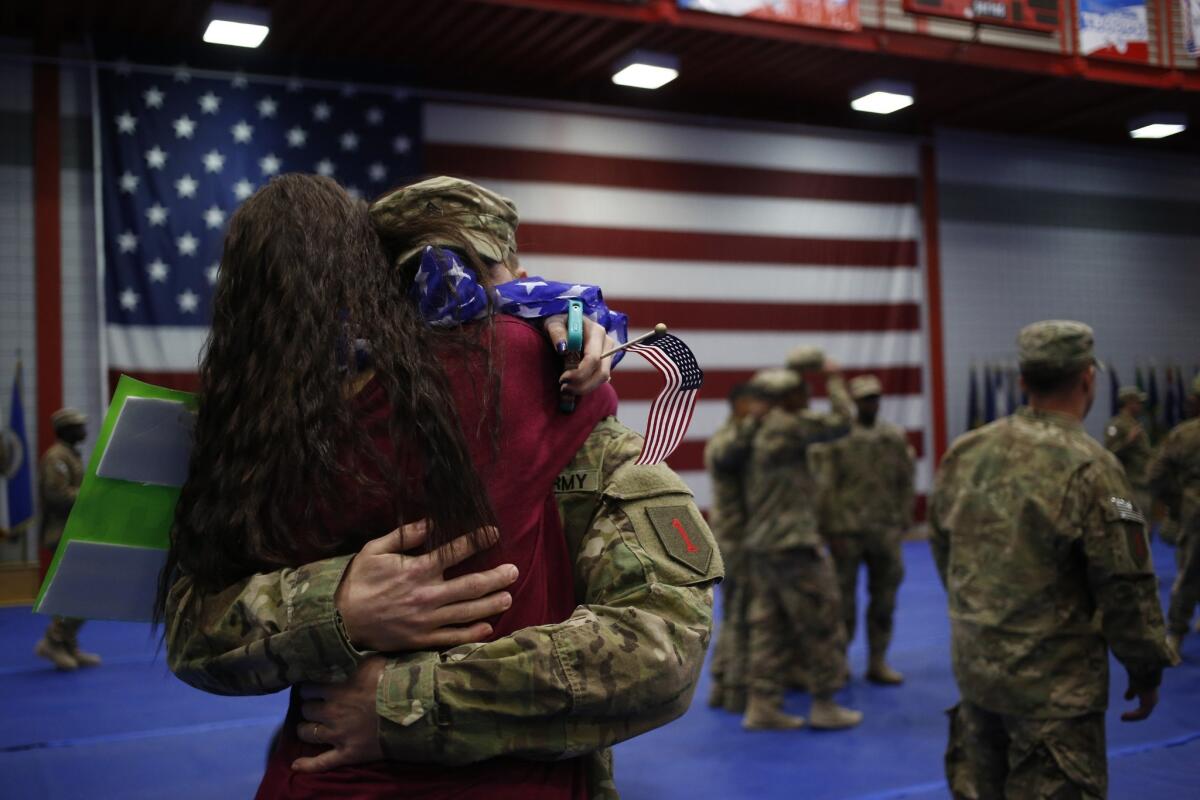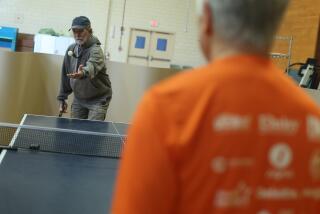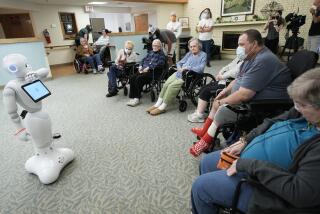More support for caregivers to Iraq and Afghanistan veterans urged

The nation needs to better acknowledge and support the efforts of the “hidden heroes” from the Iraq and Afghanistan wars: the estimated 1.1 million civilian, volunteer caregivers tending to the needs of wounded and disabled veterans, according to recommendations contained in a Rand Corp. study released Monday.
While family members and others have long cared for veterans, the veterans from two recent wars are more likely to have mental health and substance problems, making the task of providing care even more difficult, according to the study, funded by the Elizabeth Dole Foundation.
A common task for caregivers is helping the veteran “in coping with stressful situations or other emotional and behavioral challenges,” the study found. Other tasks include housework, meals, transportation and overall “health management and maintenance.”
“Caring for a loved one is a demanding and difficult task,” the researchers concluded, “often doubly so for caregivers who are juggling care duties with family life and work. The result is often that caregivers pay a price for their devotion.”
The price often involves workplace problems caused by absenteeism, strain on other family relationshipsand health problems. Many caregivers suffer from depression, the report said.
Former U.S. Sen. Elizabeth Dole, whose husband, former Sen. Bob Dole, was severely wounded during World War II, said she hopes the study serves as “a call to action” to help military caregivers. “The findings confirm this is an urgent societal crisis,” Dole said.
More than 40% of caregivers are between the ages of 18 and 30, often spouses in youthful marriages that may not survive the stress. A quarter of caregivers are aging parents.
Both the Department of Veterans Affairs and the Department of Defense military system try to include caregivers in their treatment of veterans, the study found. The VA has also begun a study of the effectiveness of caregivers in hopes of compiling “best practices.”
Still, much more needs to be done to help caregivers shoulder the burden of a spouse or family member with PTSD or traumatic brain injury or other condition, the study concludes.
“We found that 53% of post-9/11 caregivers have no caregiving network — an individual or group that regularly provides help with caregiving — to support them,” the Rand study concluded.
Theresia Ditto, whose husband was a Marine, meets monthly with other military caregivers near her home in Pittsburgh. Her husband, Michael, served in combat in Iraq and then several deployments with Marine special forces that remain classified. He has PTSD, traumatic brain injury and “the usual grunt injuries to his back and knees,” she said.
Ditto tells other caregivers not to become overwhelmed by the needs of their veteran.
“They are so used to taking care of others, they don’t take care of themselves,” Ditto said. “It’s very easy for his symptoms to carry over to you.”
Michael Ditto, 32, who left the Marines as a staff sergeant, has nightmares and periodic spells of anger. “When he does wake up with nightmares, I’m there every time: to remind him that he’s here, not there,” his wife said.
To other caregivers, she warns not to expect a cure for emotional problems. “It’s never going away: You learn to control it,” she said. “It’s the new normal.”
But even with the new normal, she said, there is hope. Her husband is working as a volunteer firefighter and is studying to be a paramedic or physician assistant. “He says he’d rather save people than hurt people,” she said.
In Gorham, Maine, Ora Freeman, whose husband was in the Army and then the Maine National Guard, acts as a “peer mentor” with other military caregivers. Harold “Butch” Freeman Jr., 52, a staff sergeant, was injured in Iraq and has leg and hip problems, as well as PTSD and TBI, which impairs his reading ability and comprehension.
“A good chunk of them are exhausted,” Freeman said of other caregivers. “But you carry on: It’s your family, you fight for it.”
Ora Freeman has been unable to work; the tasks of helping her husband are too demanding. “As soon as you wake up, you know if it’s going to be a good day or bad day,” she said. “A lot of time you try to keep your distance from him. He’s in his own little world.”
She has found that civilians “just don’t talk about” the wars in Iraq and Afghanistan or the problems of the military personnel who fought in them.
“Inside the house, you deal with it,” she said. “When you go outside, you put on your happy face.”
Rajeev Ramchand, the study’s co-leader and a senior behavioral scientist at Rand, said researchers “are worried about public interest” in the care of veterans from the wars in Iraq and Afghanistan waning.
With the study, the largest to date of military caregivers, “finally a light is being shone on this issue,” Ramchand said. Although the VA has an extensive program for caregivers, there remains “an acute shortage of efforts to provide services directly for military caregivers,” he said.
The study found that 12% of caregivers helping post-9/11 military veterans provide more than 40 hours of care per week. The care provided would cost $3 billion to duplicate, the study concluded. For that reason, support for the caregivers makes good economic sense, the study added.
Although the study used the term caregiver to include all of those helping veterans, other terms are preferred by some.
“I don’t think of myself as a caregiver,” Theresia Ditto said. “I’m a wife who happens to love a Marine who went to war.”
More to Read
Sign up for Essential California
The most important California stories and recommendations in your inbox every morning.
You may occasionally receive promotional content from the Los Angeles Times.










